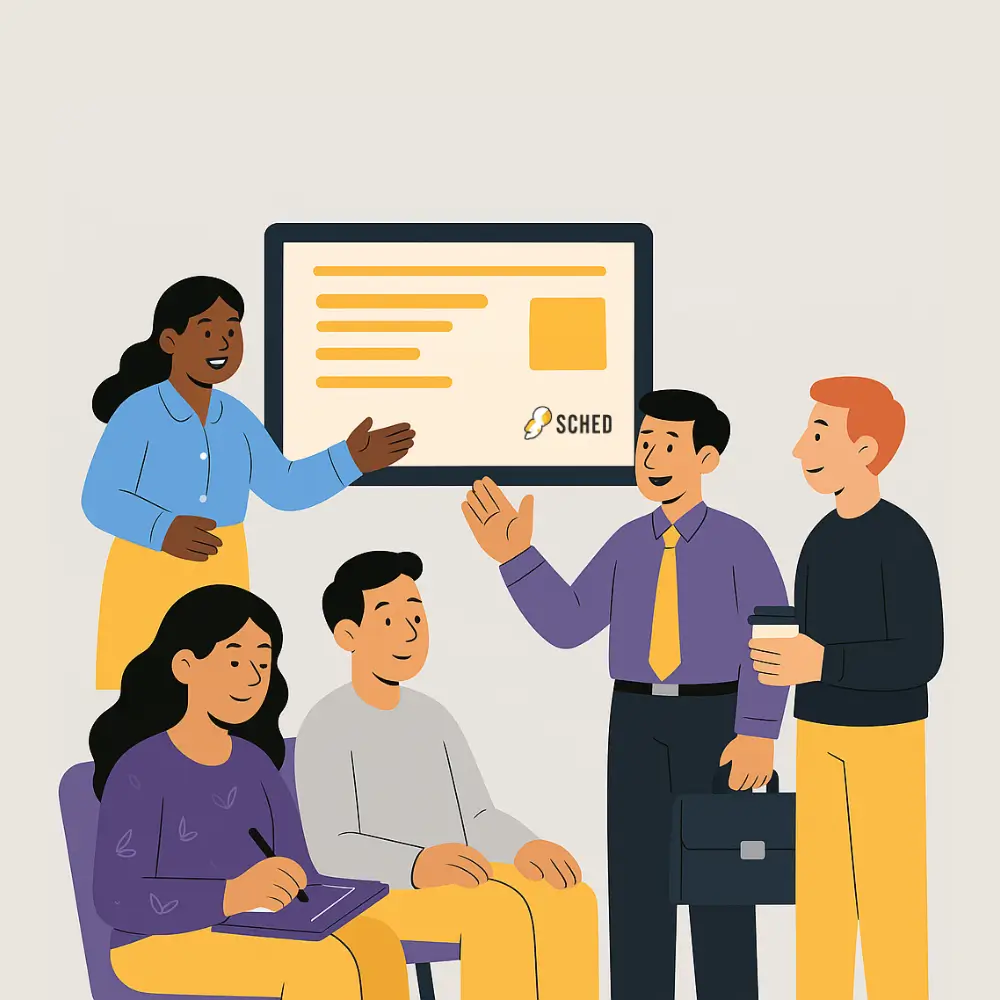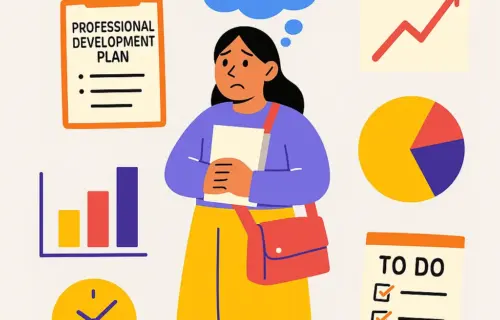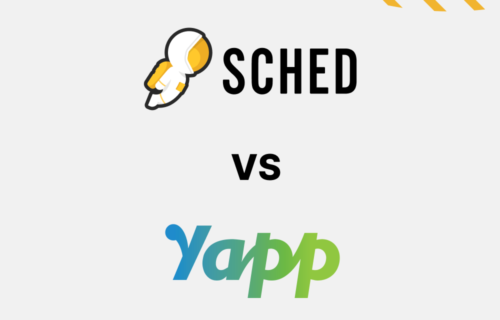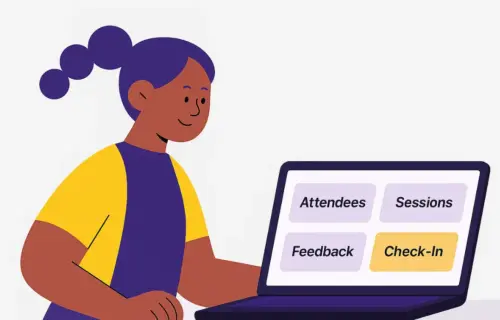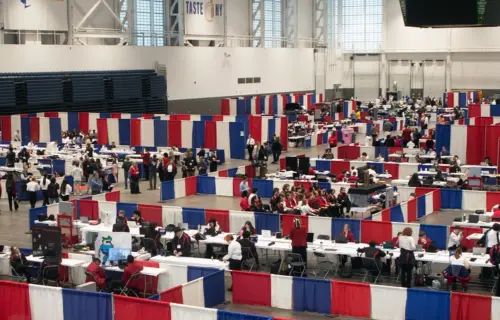Learning days should support your staff, not drain them.
You’ve seen it: a full day of sessions, built with the best intentions, but it still ends in hallway confusion, session reshuffling, and feedback forms that go unread. Not because anyone dropped the ball, but because traditional PD planning often overlooks what teachers actually need to feel supported, engaged, and respected.
At Sched, we’ve worked with hundreds of PD leaders, instructional coaches, and principals who felt the same way. What changed everything? Adopting a new mindset.
These eight principles are what we see consistently in school PD events that run smoothly, earn praise, and lead to meaningful growth.
Principle #1: Teacher Choice Isn’t Optional, It’s the Foundation
Table of contents
- 1 Principle #1: Teacher Choice Isn’t Optional, It’s the Foundation
- 2 Principle #2: Relevance Beats Theory Every Time
- 3 Principle #3: Active Participation > Passive Listening
- 4 Principle #4: Teachers Learn Best from Each Other
- 5 Principle #5: Support Doesn’t End When the Session Does
- 6 Principle #6: Less Chaos, More Clarity
- 7 Principle #7: Planning Shouldn’t Be the Hardest Part
- 8 Principle #8: Design With the Whole Experience in Mind
- 9 What Teachers Say When Professional Development is Done Right
- 10 Make PD Days Feel Worth It For Everyone Involved
PD doesn’t work when it’s one-size-fits-all.
Your teachers have different roles, needs, and goals. Giving them agency, whether that means choosing their sessions, setting their learning path, or contributing ideas, creates immediate buy-in.
Teachers feel respected as professionals, not treated like students in assigned seats.
When they can self-select sessions and access track-based schedules that match their roles or interests, the experience becomes more personal, relevant, and energizing.
Principle #2: Relevance Beats Theory Every Time
Teachers are busy.
If the content doesn’t connect to their day-to-day classroom reality, it gets mentally filtered out.
When PD focuses on discipline-specific topics, hands-on strategies, and actionable insights, it earns attention. Especially when teachers can walk away with something they can use this week, not next semester.
Use tools like Sched’s personalized schedules to allow teachers to opt into what’s most relevant for them. The result? Less resistance, more buy-in.
Principle #3: Active Participation > Passive Listening
Nobody wants to be talked at all day.
The best PD mirrors the kind of instruction we want for students: engaging, collaborative, and interactive.
When teachers have opportunities to try out strategies, participate in small-group dialogue, or reflect through shared discussion, learning sticks. Even better when facilitators model what good instruction actually looks like in action.
Principle #4: Teachers Learn Best from Each Other
Your staff is already full of expertise. PD should unlock and share it.
Creating space for teacher-led breakouts, peer proposals, and cross-campus collaboration builds connection and trust. When educators hear directly from their colleagues, it elevates the conversation and creates a sense of shared ownership.
When using features like Sched’s Call for Papers, schools make it easy for educators to propose and lead sessions, turning PD into a peer-powered experience. That sense of mutual respect and shared ownership changes everything.
Principle #5: Support Doesn’t End When the Session Does
The most valuable PD isn’t what’s taught, it’s what gets implemented. And that doesn’t happen without support.
When feedback is tied to sessions and collected while it’s still fresh, it’s more honest and more useful. And when coaching follow-ups are informed by live attendance data, your next cycle gets better.
Tools like Sched automate this process and go beyond one-day events.
Because PD isn’t a one-time workshop. With year-round support for professional development, micro-sessions, and follow-up activities, Sched helps schools build a true culture of ongoing learning, not just compliance.
Principle #6: Less Chaos, More Clarity
Even well-planned PD can unravel when details are scattered across too many places. Teachers don’t need one more email, they need one clear source of truth.
A centralized, mobile-friendly event hub gives everyone the same access to schedules, session details, and real-time updates, whether it’s a one-day training or a year-long PD series.
And when your PD hub connects seamlessly to the tools your staff already uses (Zoom links, shared drives, LMS platforms) your team can stay focused on learning, not logistics. That kind of integration makes everything easier.
Principle #7: Planning Shouldn’t Be the Hardest Part
Coordinating a PD day is a big job, but managing logistics shouldn’t be the thing that burns you out. The more your systems reduce manual work, the more time you have to focus on designing great experiences.
Automation, templates, and instant reporting can shift your team from reactive mode to strategic leadership. The right infrastructure makes the difference between chaos and confidence.
Streamline planning with QR code check-ins, reusable templates, and ready-to-go reports so you stay focused on outcomes, not paperwork.
Principle #8: Design With the Whole Experience in Mind
Too often, PD fails not because of what’s taught, but because of how the day runs. Disorganized agendas, scattered information, or tech hiccups create unnecessary stress.
A smooth, professional experience with clear schedules, mobile access, great speakers, and easy check-ins makes a huge difference in how teachers feel walking into your event. When the logistics disappear into the background, your team gets to focus on learning.
Use a platform like Sched to centralize info, personalize schedules, and handle the details behind the scenes, so you can lead with confidence.
Unlike generic event tools, Sched is designed specifically for education, so it fits how schools plan, communicate, and grow. From onboarding new teachers to managing year-round PD, it adapts to your cadence, not the other way around.
What Teachers Say When Professional Development is Done Right
When school leaders use Sched to apply these principles, here’s what we hear most often:
- “We had fewer questions before the day started than ever before.”
- “Our teachers said this was the best PD we’ve done in years.”
- “It actually felt like time well spent.”
When you shift your focus from “what content should we deliver?” to “what experience are we creating?”, everything changes.
Make PD Days Feel Worth It For Everyone Involved
You don’t need to overhaul your strategy. You just need a plan that makes the experience easier, clearer, and more aligned to what your staff needs to thrive.
At Sched, we empower K–12 leaders to create events with a professional look and feel. They can:
- Personalize PD schedules for different teams.
- Track attendance and feedback without paper.
- Find the best speakers.
- Communicate updates in real time.
- Centralize logistics in one simple, branded hub.
Sched isn’t just a one-day tool, it’s a long-term partner.
If you’re planning district-wide PD days, coaching sessions, or ongoing PLCs, Sched helps K–12 teams stay aligned, communicate better, and keep teachers focused on what matters: learning that actually sticks.
Want to plan a stress-free PD day your staff actually looks forward to? Start a free trial of Sched today.
